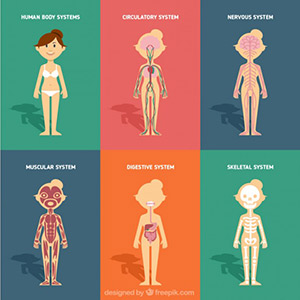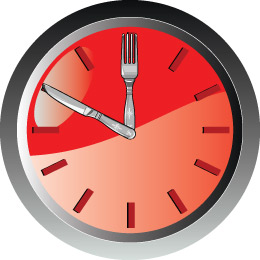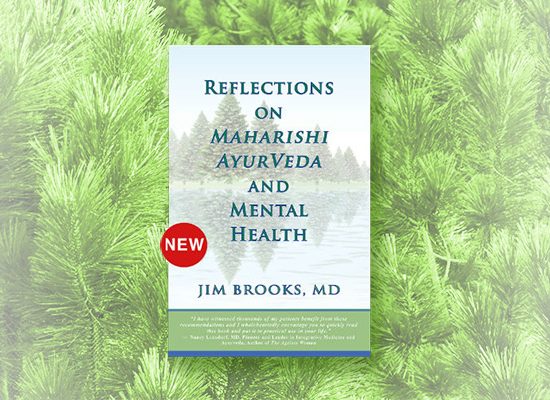Best-selling author Dr. Nancy Lonsdorf M.D. has been an Ayurvedic practitioner for more than 30 years and is recognized as one of the nation’s most prominent Ayurvedic doctors. She teaches Maharishi AyurVeda® in affiliation with the Academy of Integrative Health and Medicine and the University of Maryland School of Medicine’s Center for Integrative Medicine. A frequent speaker on national media, she continues her private practice in integrative medicine and Ayurveda, including Wellness Consultations in person or by phone.
Do you ever feel anxious or “scattered” before or during travel? Or irritable if you don’t eat a meal on time? Or have a “heavy,” tired feeling after eating a large meal?
Most of us have had such experiences, but never stopped to wonder why. With Maharishi AyurVeda (MAV), we can understand them in terms of the three Supersystems that guide and organize all the functions of our mind and body.

The body’s various systems
Think of the software programs that run things in your computer. These Supersystems or doshas are the body’s software programs—they keep it running in an orderly manner to do the things your body needs to do.
Specifically, these three Supersystems are called vata, pitta, and kapha in Ayurvedic terms—Sanskrit, to be precise. They represent the three basic Superfunctions that every living and operating system in the universe needs to be alive.
The three Superfunctions are:
Movement and flow = Vata (VAH-tuh) Think about the circulation of blood that’s necessary to bring nourishment to all parts of the body and all the movement and flow in our brain, mind, and nervous system.
Energy production = Pitta (PIT-tuh) Think about burning fuel for energy and to stay warm—our digestion and metabolism.
Substance and structures = Kapha (KAH-fuh) Think about the bones, muscles, tissues, water, and bodily fluids that make up our physical body and everything in it.
For us to have good health, each of these three Superfunctions of the body must be functioning normally. If one or more of them gets “out of balance” or disturbed in any way, symptoms are sure to follow.
For us to have good health, each of these three Superfunctions of the body must be functioning normally. If one or more of them gets “out of balance” or disturbed in any way, symptoms are sure to follow.
The Qualities of the Doshas
To understand our symptoms* and how to get rid of them with Ayurveda, we need to introduce one more Ayurvedic principle here: that each Supersystem has certain characteristics or qualities that are natural to it. Just as a desert is naturally dry and hot, or ice is cold and wet, each dosha has it’s own qualities.

Here are the qualities of each Supersystem or dosha:
- Vata = light, dry, rough, cold, moving, coarse, quick, subtle—like the wind
- Pitta = hot, sharp, pungent, sour, scorching—like fire
- Kapha = heavy, cold, slow, sticky, soft, oily, sweet, stable, solid, dense—like moist earth
Symptoms of Imbalance
Now, if we get too much of any one of these influences, such as too much cold or dryness or motion, then our vata Supersystem may go out of balance. We may begin to have too much coldness, dryness, or movement in our bodies, which give rise to vata symptoms:
- Dry skin—because vata is dry
- Constipation—due to dry stool and poor intestinal motility (a term used to describe the contraction of the muscles that mix and propel contents in the gastrointestinal (GI) tract)
- Insomnia—because the mind is too active and doesn’t settle into sleep
- Heart palpitations—due to irregular nerve conduction creating irregular beats
Understanding Our Everyday Symptoms
By understanding the doshas and their qualities, we can begin to see how our anxiety during travel is likely due to an imbalance in our vata dosha. In other words, too much activity or movement in our lives can create too much activity in our brain, hence worry and anxiety.

An irritable or angry mood when we feel hungry is related to an imbalance in our pitta dosha, which arises when our body is calling for energy or food, and may trigger sharpness, gnawing hunger, and heat—including a “hot” temper.
Our feeling of heaviness after overeating would be a result of imbalanced kapha dosha, since heavy, full, stagnant, or lethargic are characteristics of the kapha Supersystem.
What’s the Key to Healing the Ayurveda Way?
The key to healing all this imbalance is to apply the principle of opposites.
This principle simply means that whenever the qualities of a dosha are added from outside our bodies—say, from the foods we eat, or our activity, or the weather conditions—they tend to add to and increase or “aggravate” that dosha in our system. But if we then apply or add opposite qualities, this brings a dosha back into balance by decreasing, balancing, or “pacifying” it.
The key to healing all this imbalance is to apply the principle of opposites.
How Does the Principle of Opposites Work?
We already apply this principle of opposites every day of our lives. Here’s how simple it is. When your mouth feels dry, you drink some water to wet your mouth and remove the dryness. When you feel cold, you turn up the thermostat and warm up. If your stomach is empty and your cells devoid of nutrients, you fill up with nourishing foods.
If you don’t respond to the needs of your body in this simple manner, of course, you begin to feel uncomfortable.
Thirst, hunger, discomfort, and the like are messages from your body’s ever-intelligent Supersystems alerting you to attend to your body at that moment. The more knowledge and understanding you have in applying the appropriate remedies, the better you feel!
Knowing how to balance your doshas enables you to be much more precise in selecting the right foods and other measures to stay healthy and recover from any symptoms you may be having.
Thirst, hunger, discomfort, and the like are messages from your body’s ever-intelligent Supersystems alerting you to attend to your body at that moment.
Let’s Check Back with Jessica
Remember Jessica in our last discussion on Supersystems? She had each of the symptoms I just described above—dry skin, constipation, insomnia, and heart palpitations. These are all symptoms of an increased or aggravated vata.
Now you can understand how she came to have these particular symptoms all together—because there was one underlying imbalance in vata.
For Jessica, balancing her vata happened naturally when she made some simple adjustments in her diet and daily routine. For example, for lunch she changed her daily salad bar of colder, uncooked foods and started introducing warm, well-cooked foods into her diet. Getting to bed earlier and getting extra rest was another lifestyle change that helped Jessica reduce her vata symptoms.
Lastly, being regular with her twice-daily practice of the Transcendental Meditation® (TM) technique gave her body the deepest access to its own inner intelligence, to facilitate healing from the most profound level. After several months of following these simple guidelines, Jessica was feeling much happier and healthier, and very inspired that she was able to heal her symptoms naturally!
More Tips Coming Soon
In my next article, look for a quiz to help you find your Supersystems and more tips on how to balance your Superfunctions.
Until then, do you want more help to heal and balance? For Ayurvedic tips to reduce stress for your type, check out my Supersystems quiz, and get weekly tips at my website.
See you again soon!
* We are referring to symptoms that are mild and not signs of more serious health conditions that may need medical treatment as well. In such cases, see your doctor for evaluation and treatment. Maharishi AyurVeda can help as a complementary treatment, but the simple tips offered here are not enough to treat more serious health conditions.
For more information on Dr. Lonsdorf’s practice, visit www.drlonsdorf.com. To schedule an Ayurvedic Wellness Consultation by phone or teleconference, please contact Dr. Lonsdorf’s office at 641-469-3174 or healthoffice@drlonsdorf.com.
Copyright 2017, Nancy K. Lonsdorf, M.D. All rights reserved. Do not reproduce without written permission of the author.







How do I reduce dryness of my vata? Through what foods or techniques…
Thanks for your question, Ryan. Check out Dr. Nancy’s latest article for tips on Vata https://enjoytmnews.org/whats-your-mind-body-type/ It includes a quiz to help find your mind-body type, and lots of tips.